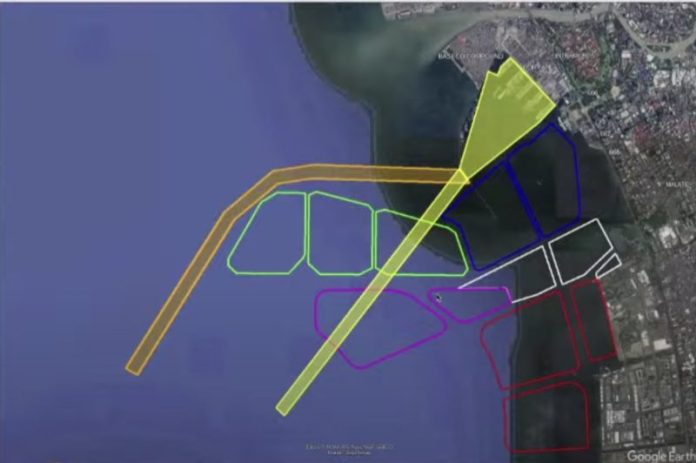
-
Reclamation projects in Manila Bay directly impact Manila South Harbor’s operations and could raise shipping costs
-
Sean James Perez, senior vice president of Asian Terminals Inc., said four reclamation projects cover the entrance channel to the terminal and the anchorage berths
-
Association of International Shipping Lines president Patrick Ronas is worried the new channel will mean an additional $3,000 to $4,000 cost per vessel
Reclamation projects in Manila Bay are affecting operations at Manila South Harbor and could lead to higher costs for shipping lines using the terminal, according to industry officials.
At a recent Senate Committee hearing, Asian Terminals Inc. (ATI) senior vice president Sean James Perez said four reclamation projects cover the entrance channel to the Manila South Harbor and the harbor’s inner anchorage. ATI holds the concession to Manila South Harbor.
Perez identified the four projects as Pasay Reclamation Project of the Pasay Harbor City Corp., Manila Waterfront City by Waterfront Manila Premier Development Inc., Horizon Manila of JBros Construction Corp., and Manila Solar City of the Manila Goldcoast Development Corp.
The first two are ongoing and the two others in the preparatory or implementation stage.
Last August, Environment Secretary Maria Antonia Yulo-Loyzaga said President Ferdinand Marcos, Jr. ordered the suspension of all 22 reclamation projects in Manila Bay for a compliance review with environmental regulations.
“When we saw the layout of the geographical map, (the reclamation) actually covered the entrance channel to our facility, the inner breakwater,” Perez said, adding that the reclamation projects would also cover Manila South Harbor’s inner anchorage.
“We used to have 18 but we’re now having 12 anchorage berths and that in effect would also be covered,” Perez noted.
Perez said this will have an impact on their concession with the Philippine Ports Authority (PPA) “because we will not be able to service the vessels and there will be other repercussions as well in terms of our ability to serve the stakeholders.”
He said ATI already voiced their concerns on the projects in 2018 when they were first notified, and continued to work closely with PPA on the matter. But now, a new sealane has been assigned.
PPA earlier relocated the anchorage grounds and pilot boarding station in Manila South Harbor “in view of the new Manila South Harbor navigational sealane and to ensure the safety of vessels navigating the coastal waters of Manila Bay.”
READ: PPA relocates anchorage grounds at Manila South Harbor
Another concern is rising water levels due to reclamation, Perez said, adding this will have to mean an adjustment for ATI.
During the same hearing, Association of International Shipping Lines (AISL) president Patrick Ronas raised concerns over the location of the new channel to Manila South Harbor.
The longer trip to the quarantine boarding and harbor pilot station means each vessel may need to fork out an extra $3,000 to $4,000 in channelling charge or special services charged by harbor pilots.
Currently, 65 to 70 foreign vessels call Manila South Harbor each month.
In a Viber message to PortCalls, Ronas said AISL sought guidance from PPA and is sticking to the PPA-mandated tariff, which states that special services can be charged only upon request of the vessel master.
Joseph John Literal, assistant general manager for reclamation and regulation for Philippine Reclamation Authority, said during the hearing that only the Pasay Reclamation Project has received Presidential Proclamations, declaring their area as alienable and disposable land and reserving them for development.
Senator Aquilino Pimentel III, in response, said: “That means if we can find something objectionable here, we can inform the Office of the President to restrain” from issuing proclamations for the other reclamation projects.
He said that in the Philippines, his impression is that reclamation is done to build mixed-use development that includes condominiums, and not specifically to improve ports as is the case with other countries. – Roumina Pablo




